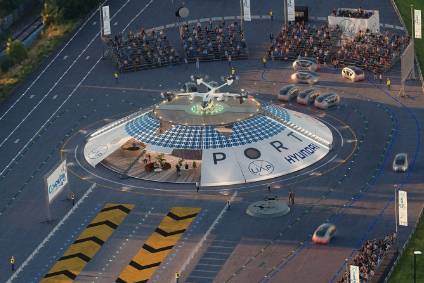 |
|
The project is aimed at providing practical infrastructure for electric VTOL craft that could transport people and goods around cities in the future |
Hyundai Motor Group, Coventry City Council and the UK Government have partnered with Urban Air Port to launch what is described as the world’s first site – Air One – to demonstrate the potential of urban air mobility for the UK and worldwide.
The Urban Air Mobility Division of Hyundai Motor Group has chosen Urban Air Port as its priority infrastructure partner to support global growth of this new sector. The South Korean company plans to create its own e-VTOL aircraft and support the broader urban air mobility eco-system. Hyundai Motor Group is supporting the development of Air-One as part of its plan to commercialise its aircraft by 2028.
Urban Air Port Air-One is described as an innovative hub for future electric Vertical Take-Off and Landing (e-VTOL) aircraft – such as air taxis and autonomous delivery drones – that will transport people and cargo across cities in the coming years.
It is claimed the Urban Air Port will reduce congestion, cut air pollution and help achieve a zero carbon future. It can be integrated with electric vehicles and sustainable public transport, the partners claim.
Urban Air Port plans to install more than 200 zero emission sites worldwide over the next five years in response to global demand.
Air-One is to be launched in Coventry later this year.
NASA predicts that urban-air mobility in the US alone could be worth up to $500bn and states that a significant barrier to market growth is the lack of infrastructure, an issue which Urban Air Port was established to resolve.
Ricky Sandhu, Founder and Executive Chairman of Urban Air Port, said: “Cars need roads. Trains need rails. Planes need airports. eVTOLs will need Urban Air Ports. Over a hundred years ago, the world’s first commercial flight took off, creating the modern connected world. Urban Air Port will improve connectivity across our cities, boost productivity and help the UK to take the lead in a whole new clean global economy.
“Flying cars used to be a futuristic flight of fancy. Air-One will bring clean urban air transport to the masses and unleash a new airborne world of zero emission mobility.”
Pamela Cohn, Chief Operating Officer for the Urban Air Mobility Division of Hyundai Motor Group, said: “As we advance our eVTOL aircraft programme, development of supporting infrastructure is imperative. Air-One® is a unique project that is set to help lead the way in developing a robust, accessible and intermodal infrastructure network for future mobility. We are excited to be part of this partnership in the UK, and look forward to working together to create community impact and opportunity through safe, affordable, and human-centred mobility solutions.”
The physical footprint of an Urban Air Port is 60% smaller than a traditional heliport (the most comparable existing infrastructure). Using innovative construction, the sites can be installed in a matter of days, emit net zero carbon emissions and can be operated completely off-grid, meaning they do not always have to rely on a suitable grid connection.
Urban Air Port is designed to support any e-VTOL aircraft and complements other modes of sustainable transport as a hub for electric vehicles, buses or scooters. The design enables Urban Air Ports to be easily moved to alternative sites, as the air-mobility sector develops. This design also means the sites are ideal for disaster emergency management. Urban Air Ports can rapidly deploy drones and other eVTOL to collect and transport emergency supplies, equipment and people where needed.
Gary Cutts, UK Research and Innovation Future Flight Challenge Director, said: “Urban Air Port has the potential to revolutionise cities across the world, making them more connected, cleaner and accelerating our green economic recovery. This project epitomises the purpose of the Future Flight Challenge fund – it is innovation at its finest – and will help to position the UK at the vanguard of electric urban air mobility.”
The company plans to develop more than 200 sites in the next five years to meet global demand. Cities across the UK and many more globally have already expressed an interest in installing an Urban Air Port. Having secured funding for Air-One, Urban Air Port is now in discussions with investors to support its rapid commercialisation and global growth.
Urban Air Port says it chose Coventry for the first site due to its important location in the heart of the UK and because it is a historic hub for the automobile and aerospace industry, with a pool of people and skills that can support the manufacturing industries of the future. The city’s unique location also provides easy access within four hours to most parts of the country.
Air-One will be unveiled during Coventry’s UK city of culture celebrations in 2021 and continue to form part of the Commonwealth Games in 2022.
Malloy Aeronautics, a UK-based drone developer, logistics and engineering company, is Urban Air Port’s UK drone aircraft partner. The company’s large cargo drones will be demonstrated at the Air-One site.
Oriol Badia, CEO of Malloy Aeronautics, said: “It is a key goal for Malloy – to introduce unmanned air logistics into an urban environment and merge it with supporting infrastructure that is flexible and resilient, hosting intelligent operating systems and state of the art innovation. Air-One provides the ability to service multiple transport requirements of the future – from disaster relief to essential and everyday supplies for citizens across the UK. These are truly exciting opportunities especially with a strong partnership between Malloy and Urban Air Port – thus unifying serviceability and operability, forming a turnkey product.”
Urban Air Port has been awarded a £1.2 million grant from UK Research and Innovation’s Future Flight Challenge. The programme is funded by £125 million from the Industrial Strategy Challenge Fund and is expected to be matched by up to £175 million from industry.

